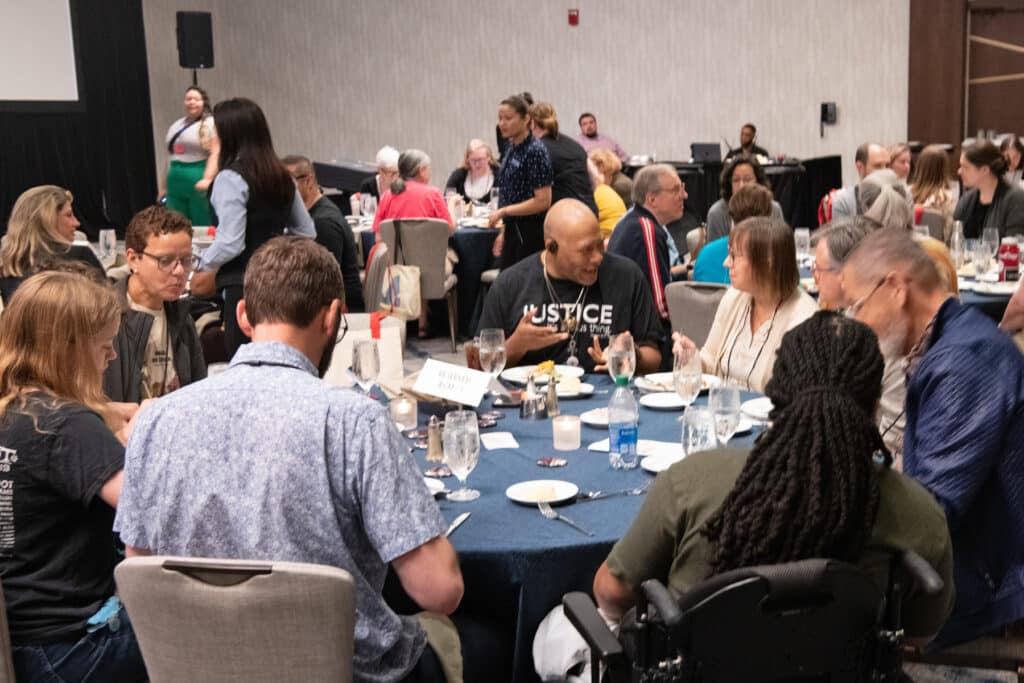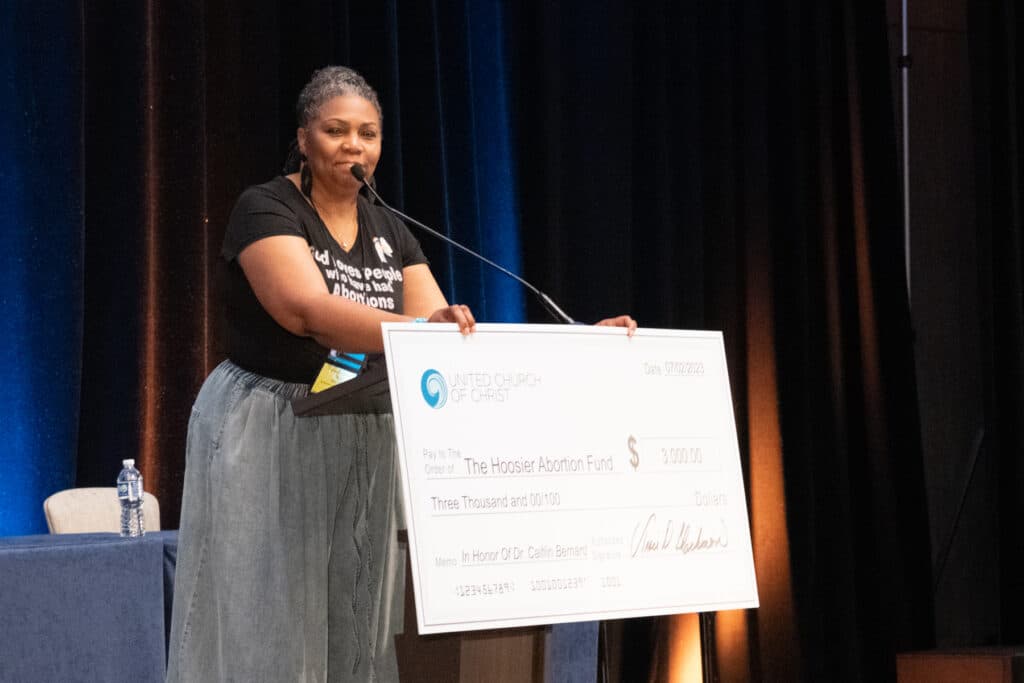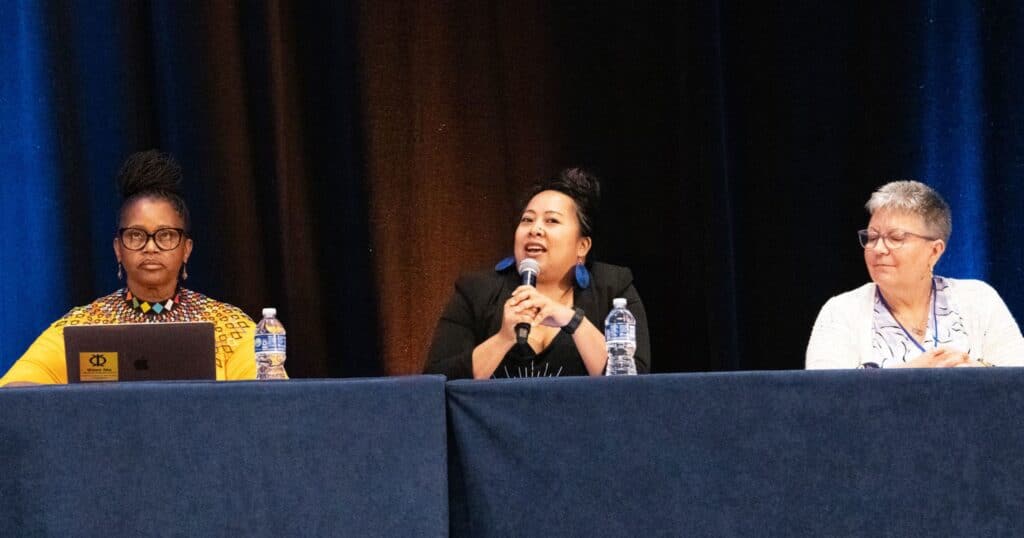Advocates share ways to fight for reproductive rights during town hall at Synod
Reproductive justice advocates gathered at General Synod 34 on Sunday, July 2 to regird for a new battle for reproductive rights, even as they acknowledged the United Church of Christ’s more than 50 years of leadership in that fight.
At the start of the Reproductive Justice Town Hall Luncheon, the Rev. Traci Blackmon, Associate General Minister, recalled receiving a phone call after the U. S. Supreme Court issued its so-called Dobbs decision just over a year ago. That ruling overturned Roe v. Wade, the court’s 1973 decision establishing the right of women to choose an abortion. Blackmon said her 88-year-old caller urged her: “Do something. I didn’t spend time fighting for Roe to have it end up like this.”
Sandy Sorensen, who helped lead that fight as the longtime head of the UCC’s Washington, D.C. office, recalled for the audience that previous General Synods had adopted eight resolutions in support of reproductive freedom, and that the UCC had promoted family planning services, contraception access and clergy abortion counseling even in the years before the Roe decision. The current General Synod will consider yet another resolution to address the issue, this one affirming abortion as health care in the wake of the Dobbs ruling.
‘No silver bullet’
The luncheon brought together faith leaders and abortion rights activists to explore what organizers billed as “faithful engagement in a post-Roe world.”
Elaina Ramsey, executive director of Faith Choice Ohio, said there was “no silver bullet strategy to fix this mess, this crisis that we are in,” one she said had been “manufactured” by opponents over the past 50 years. “We are not going to legislate our way out of this crisis, we’re not going to elect our way out of it and we sure are not going to message our way.”
Instead, she said, “We are going to have to love our way through it.”
Ramsey, who is pursuing ordination with the UCC, outlined three ways to “show up and put our faith into action for reproductive freedom”:
- Build relationships to create “a community to sustain this fight for the long haul.” She urged UCC members to extend their relationships “beyond church walls,” engaging with abortion funds, local clinics and medical practitioners to help demonstrate “that abortion is not a four-letter word.” She noted that those who provide abortions are “grieving and mourning, and they need pastoral support.”
- Think beyond abortion access and rights. “Roe was never enough,” she asserted, urging attendees to tie the right for reproductive justice to the broader fight for justice. She and Sorensen highlighted the work of the organization SisterSong in linking these issues for marginalized women and trans people.
- “Show up,” even when “the news cycle moves on” and “the money dries up” and “people want to stop talking about it.” “Keep showing up,” Ramsey said, “especially when we end up having our faith questioned.”

Missouri lawsuit
The Rev. Andrea Vassell, a UCC minister representing the Spiritual Alliance of Communities for Reproductive Dignity (SACReD), urged participants to reflect on “why” these issues were important to them. “We are here and when we can answer our ‘why,’ we take the offensive and can stop being defensive.”
She asserted, “As people of conscience, as people of God … we have an obligation to claim the moral authority, to push back” against the picture that opponents create about abortion. “We also have an obligation to claim the spiritual authority and push back at that picture that they are saying is ‘the church.’”
The event highlighted the rapid pace of abortion rights victories and defeats, big and small, even as General Synod was meeting. The town hall’s moderator, the Rev. Cynthia Bumb, provided an update on Blackmon v. the State of Missouri.
Blackmon, Bumb and two other UCC clergywomen are among the plaintiffs challenging that state’s ban on abortion as a violation of the separation of church and state and the clause of the Constitution that prohibits the establishment of a state religion.
Blum shared that she had retired from a longtime post at the UCC-affiliated Emmaus Homes the same week as the Dobbs decision was issued and had sought God’s guidance on her next calling.
“A lawsuit was not on my list of things to do,” she noted.
But she was happy to share “amazing news” from the night before: the state had tried to have the lawsuit dismissed, but a St. Louis judge had ruled that the plaintiffs had standing and that most parts of their lawsuit could proceed.
Building wider relationships
In another case that moved forward during Synod, the Indiana Supreme Court held up the hosting state’s new, strict abortion ban, though the law is still under legal challenge, again on religious liberty grounds.

Blackmon lifted up the name of Dr. Caitlin Bernard, an Indianapolis OB-GYN who risked her medical license to provide abortion care to a 10-year-old rape victim. Bernard received a $3,000 fine for speaking out about the case; Blackmon said that although the UCC could not legally cover Bernard’s fine, it was making a donation, at the doctor’s request, to the Hoosier Abortion Fund.
During the Q&A session, the three speakers affirmed the importance of working with Jewish leaders, who also have a long history of support for reproductive rights. Ramsey noted that in the Jewish tradition, life begins “at the first breath.”
Vassell, a former nurse, said that when she attended a White House meeting on the issue, she had learned that in that tradition, the first 40 days of a pregnancy were considered to be “a woman’s water.”
Building these kind of wider relationships, they said, would help fight back against the notion of “fetal personhood” that abortion opponents espouse.
The speakers said they were trying to learn more about how to discuss reproductive rights with other communities, including trans people, and sought “forgiveness” if they made mistakes.
The Rev. Sherry Warren, the UCC’s minister for women’s and gender justice, closed by saying: “Rather than lament what has been lost … let us continue to march” toward justice.
Proceeds from the fund-raising luncheon, sponsored by Frontline Faith and Planned Parenthood, will help support the work of the UCC’s reproductive justice working group.
Sara Fitzgerald, a General Synod newsroom volunteer, is a member of Rock Spring Congregational UCC in Arlington, Va., and a member of the board of the UCC Media Justice Ministry.
Content on ucc.org is copyrighted by the National Setting of the United Church of Christ and may be only shared according to the guidelines outlined here.
Related News
A Moment of Silence
The weekend news was alarming. Two students shot and killed with 9 injured at Brown University...
Read MoreIn hope-filled worship service, UCC and United Church of Canada celebrate full communion past and future
On Saturday, Dec. 13, many from the United Church of Christ (UCC) and the United Church of...
Read More‘A Gift of God to the World:’ Christmas greetings from the General Minister and President
As Christmas quickly approaches, UCC General Minister and President/CEO the Rev. Karen Georgia...
Read More


